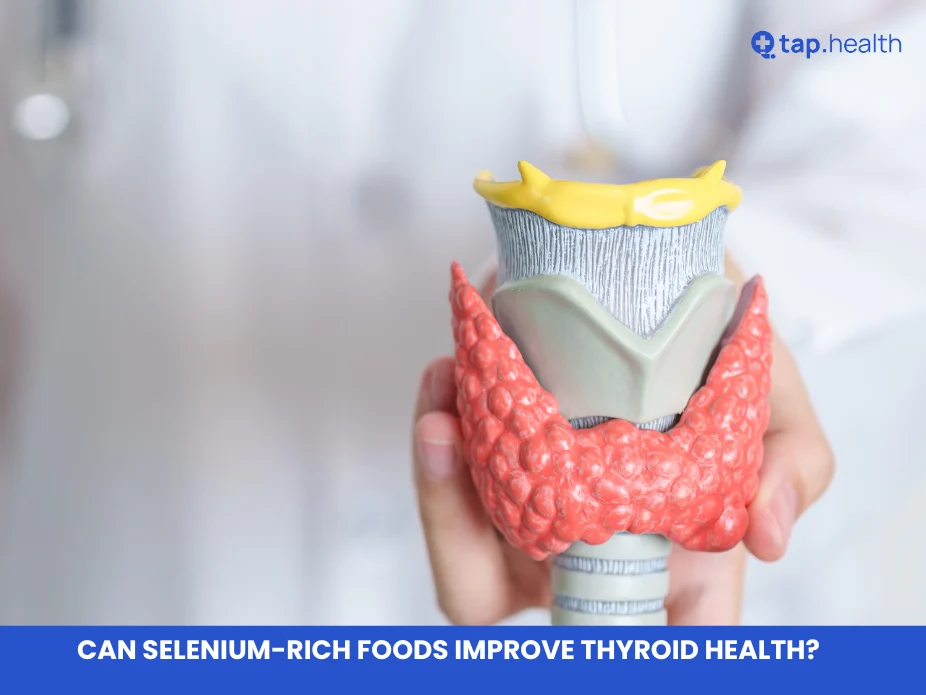The thyroid gland is a key player in regulating your metabolism, energy levels, and overall health. But did you know that your diet can significantly impact thyroid function? While iodine is often the first nutrient that comes to mind when discussing thyroid health, selenium plays an equally important role. This essential mineral helps your thyroid produce hormones and protects the gland from oxidative stress, which can otherwise damage the thyroid tissue.
In this blog post, we will explore how selenium-rich foods can improve thyroid health, the science behind it, and which foods are best for boosting selenium levels in your diet. Whether you’re dealing with thyroid dysfunction or simply looking to support your thyroid, adding more selenium to your meals could be an important step.
What is Selenium and Why Does It Matter for Thyroid Health?
Selenium is a trace mineral that is naturally present in some foods, and it plays a crucial role in the production of thyroid hormones. The thyroid uses selenium to activate thyroid hormones (like T3 and T4) and to protect itself from oxidative damage.
When your body is low on selenium, it can struggle to produce enough thyroid hormones, potentially leading to thyroid dysfunction. Selenium’s antioxidant properties also help protect the thyroid from free radicals, which can cause inflammation and tissue damage.
Without adequate selenium, the thyroid may not function optimally, which can contribute to conditions like hypothyroidism (underactive thyroid), goiter (an enlargement of the thyroid gland), and even thyroid cancer in some cases.
How Does Selenium Support Thyroid Function?
Selenium supports thyroid health in several key ways:
- Activation of Thyroid Hormones: Selenium is essential for the conversion of the thyroid hormone T4 (thyroxine) into its active form, T3 (triiodothyronine). Without this conversion, your metabolism can slow down, leading to fatigue, weight gain, and other hypothyroid symptoms.
- Antioxidant Protection: Selenium has antioxidant properties, which help protect the thyroid gland from oxidative stress. Free radicals can damage cells and tissues, contributing to inflammation and the development of thyroid disorders. Selenium helps neutralize these free radicals, reducing the risk of thyroid dysfunction.
- Regulation of Thyroid Autoimmunity: Selenium may also help regulate autoimmune thyroid conditions, such as Hashimoto’s thyroiditis and Graves’ disease. These conditions cause the immune system to attack the thyroid, leading to inflammation and dysfunction. Selenium’s anti-inflammatory effects may help manage these conditions.
Selenium Deficiency and Thyroid Health
A deficiency in selenium can have serious consequences for thyroid health. When selenium levels are too low, it may cause:
- Reduced Thyroid Hormone Production: Without enough selenium, your thyroid cannot effectively produce the hormones necessary for regulating metabolism, leading to symptoms like fatigue, weight gain, and depression.
- Increased Risk of Goiter: Goiter is the enlargement of the thyroid gland, and it can be caused by both iodine and selenium deficiencies.
- Thyroid Autoimmune Disorders: Selenium deficiency has been linked to an increased risk of autoimmune thyroid diseases, including Hashimoto’s thyroiditis and Graves’ disease.
- Oxidative Damage: Without sufficient selenium, the thyroid gland is more vulnerable to oxidative stress, which can damage thyroid cells and impair their function.
Selenium-Rich Foods for Thyroid Health
Now that we understand the importance of selenium for thyroid function, let’s look at the best foods to include in your diet to support thyroid health.
1. Brazil Nuts
Brazil nuts are perhaps the richest food source of selenium. Just one or two Brazil nuts a day can provide more than your daily recommended intake of selenium.
Why It Works:
Brazil nuts are loaded with selenium, with just a single nut containing up to 95 micrograms of selenium—well above the daily requirement for most people.
How to Incorporate Them:
Snack on Brazil nuts or add them to smoothies, oatmeal, or salads for a selenium boost.
Real-life Scenario:
John, a 40-year-old man diagnosed with hypothyroidism, began including Brazil nuts in his diet. Within a few months, he noticed improved energy levels and a reduction in his thyroid-related symptoms.
2. Sunflower Seeds
Sunflower seeds are another great source of selenium. They are not only rich in this mineral but also provide healthy fats and vitamin E, which further support thyroid health.
Why It Works:
A quarter-cup of sunflower seeds contains approximately 19 micrograms of selenium, contributing to the daily intake needed for optimal thyroid function.
How to Incorporate Them:
Sprinkle sunflower seeds on top of salads, mix them into granola, or eat them as a quick snack.
3. Eggs
Eggs are a versatile and nutrient-dense food that provides a decent amount of selenium. They also contain high-quality protein and other essential vitamins and minerals that support overall health.
Why It Works:
One large egg contains about 15 micrograms of selenium. Incorporating eggs into your meals is a simple and easy way to get more selenium.
How to Incorporate Them:
Eggs can be boiled, scrambled, poached, or made into omelets. They’re an excellent addition to breakfast or can be added to salads and sandwiches.
4. Tuna and Other Seafood
Seafood, especially tuna, is rich in selenium and provides other essential nutrients like omega-3 fatty acids, which are important for thyroid function.
Why It Works:
A 3-ounce serving of tuna provides about 68 micrograms of selenium. Other types of seafood like salmon, sardines, and shrimp are also great sources of selenium.
How to Incorporate Them:
Add tuna to salads, sandwiches, or pasta dishes, or enjoy it grilled, baked, or canned.
5. Whole Grains (Brown Rice, Oats, and Barley)
Whole grains are another excellent source of selenium, especially when consumed in their unprocessed form.
Why It Works:
A cup of cooked brown rice contains about 19 micrograms of selenium, and oats are also a great source, with around 13 micrograms per serving.
How to Incorporate Them:
Use whole grains as the base for meals. Brown rice and oats can be added to soups, stews, or breakfast bowls.
Real-Life Scenarios: Selenium and Thyroid Health
Case Study 1:
Megan, a 45-year-old woman with an underactive thyroid (hypothyroidism), was feeling tired and struggling with weight gain. After incorporating selenium-rich foods like Brazil nuts and tuna into her diet, she noticed an increase in her energy levels and better control over her weight.
Case Study 2:
James, diagnosed with Hashimoto’s thyroiditis, struggled with fluctuating thyroid hormone levels. After working with his healthcare provider to increase his selenium intake, including eating more sunflower seeds and whole grains, his thyroid function stabilized, and his inflammation decreased.
Expert Contributions: Selenium and Thyroid Function
The European Thyroid Association recommends a six-month trial of selenium supplements for patients with mild to moderate Graves’ orbitopathy 1. However, opinions on selenium supplementation vary, and many experts emphasize obtaining selenium primarily through diet rather than supplements.
Recommendations Grounded in Proven Research and Facts
Research consistently shows that selenium plays an important role in maintaining healthy thyroid function. To support your thyroid, it’s essential to:
- Eat Selenium-Rich Foods: Regularly include Brazil nuts, sunflower seeds, eggs, and seafood in your diet.
- Avoid Excessive Selenium Intake: While selenium is essential, too much can be harmful. Stick to the recommended daily intake (55 micrograms for most adults) to avoid toxicity.
- Consult a Healthcare Provider: If you have thyroid disease, work with your doctor to tailor your diet and possibly supplement with selenium if necessary.
FAQ on Can Selenium-Rich Foods Improve Thyroid Health?
1. How much selenium do I need daily?
The recommended daily intake for selenium is 55 micrograms for adults. Pregnant and breastfeeding women may require slightly more.
2. Can selenium improve thyroid autoimmunity?
Some studies suggest that selenium supplementation may reduce inflammation and improve thyroid function in autoimmune thyroid diseases, like Hashimoto’s and Graves’ disease.
3. What happens if I have too much selenium?
Excessive selenium intake can lead to selenium toxicity, causing symptoms like nausea, diarrhea, and in severe cases, hair loss and nerve damage.
4. Can selenium replace thyroid medication?
No, selenium can’t replace thyroid medication. It supports thyroid health but does not cure thyroid disorders. Always follow your doctor’s advice for managing thyroid conditions.
References
- Selenium and Thyroid Health
Source: National Institutes of Health, Selenium



